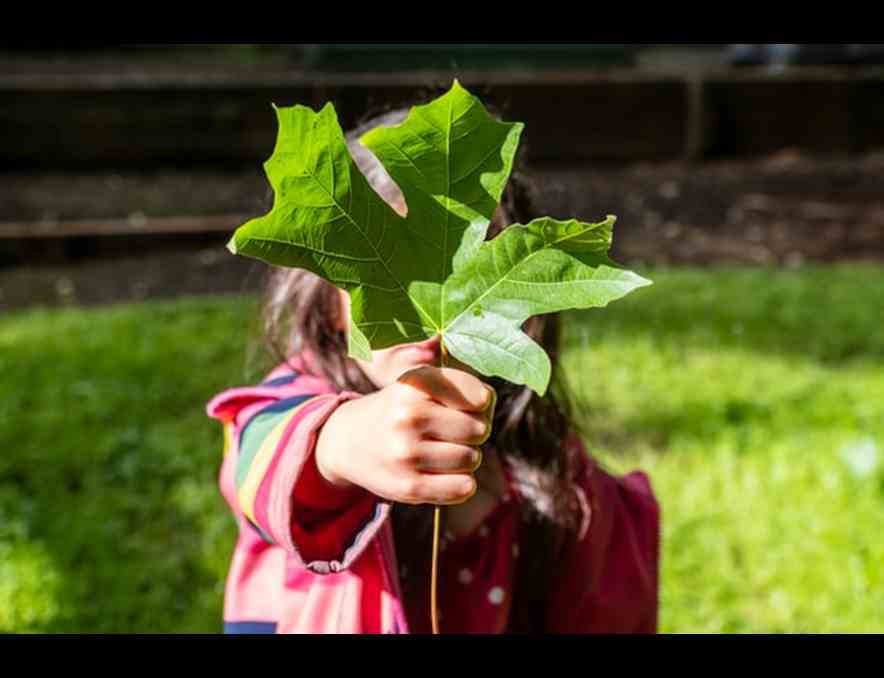As we launch our new early childhood education for sustainability resource, Janet King, our Sector Manager for Education and Childcare, explains why it’s vital to embed education for sustainability into all aspects of early childhood, and how our resource will support practitioners, students and parents to do so.
Given the urgency of the climate change issue and the need for a nationwide and cross-generational approach, the teaching and practicing of sustainability must start as soon as learning begins, with early childhood.
Children need to be aware of how they are interconnected within a wider ecological context, and that actions have an impact. They must not be framed as “saviours” of the planet, but rather as being a vital part of a wider picture. Research shows that fundamental values and attitudes are formed at this time, so it’s important to lay the foundations then. Early years settings are primed for educating children on sustainability and there are several easy steps that can be taken to promote awareness and create lifelong habits.
Teaching sustainability
Beyond the environmental benefits of teaching children about sustainability from a young age, learning about it helps children to make sense of the world around them, exploring the “what if” and “how”. Children then begin to connect with and develop a passion for the environment, for nature and their relationship with it, as well as understanding the criticality of sustainability.
Alongside teaching sustainability practices, spending time immersed in nature can have a positive impact on young children, enabling them to visualise the environment that they are trying to protect. Through education on trees, plants and wildlife, early years settings can make sustainability a central part of children’s thinking.
Creating a garden that the children can have an active role in provides them with an authentic ecological opportunity. It is really important for young children to participate in gardening in order to promote sustainable food consumption. It shows them that they are fully capable of growing their own produce in a sustainable way.
Another option to help develop awareness in young children is to visit a local farm. It is more crucial than ever for children to have an understanding of where their food comes from, and visiting a farm encourages them to actively think about what it is they eat. Events such as National Outdoor Week (12 – 20 March), National Insect Week (20 – 26 June) and National Tree Week (25 November – 3 December) can be used as inspiration for teaching children about nature.
Practicing sustainability
In addition to what we’re teaching children, early years organisations need to be putting sustainability practices into place in their own settings. Once again, this can be done through relatively easy steps that are often employed in the home but not necessarily in the workplace. As a prime example, if early years settings attempt to reduce the individual packaging on items, for example by using reusable lunch boxes, their levels of waste going to landfill will be significantly reduced.
Similarly, while nappies play an important role in early childhood, unfortunately they also play a key role in polluting the planet. Every day, 8 million disposable nappies are thrown away in the UK, accounting for 3 percent of all household waste. Early years settings are well placed to tackle this. Alternative methods include switching to reusable cloth or biodegradable nappies, or at least raising awareness of such products.
Through their proximity to children and their families, the early years sector is in a great position to influence future generations on their approach to sustainability, as well as reducing the carbon footprint of the industry as a whole, and so much is happening already.
Implementing best practice across the sector
Beyond the day-to-day things that providers can be doing to increase awareness and action around sustainability, there also needs to be more action on a broader, sector-wide scale to generate long-term and embedded change.
At NCFE, one of our priorities is supporting early years providers to incorporate sustainability in their practices. This is in line with the Birth to Five Matters 2021 guidance developed by early years professionals to support the implementation of the Early Years Foundation Stage (EYFS), which sets standards for the learning, development and care of children from birth to five years old.
We’re delighted to have worked with Dr Diane Boyd of Liverpool John Moores University to develop a resource that embeds sustainability and STEM (science, technology, engineering and maths) into early years experiences for young children. This will support practitioners, students, and parents to learn more about our responsibilities to each other and the world in which we live.
The resource provides an opportunity to embed education for sustainability into all aspects of early childhood, from level 2 to level 7 and will be accessible across the early years and childcare suite of qualifications. It aims to support practitioners working directly with young children; students during their training; and parents with young children. This holistic approach to entrenching sustainability into early years education will help to secure long-term impact.
Through providing innovative, yet simple and straightforward ideas, practitioners will more easily be able to make sustainability a central part of their practice.
A holistic approach
Overall, it’s clear that we need to be tackling the issue of sustainability across many different facets of the early years sector. From how providers tackle sustainability on a practical level, to teaching and learning and resources, it’s through bringing everything together that we’ll see tangible results. This is an exciting time for early years to be at the forefront of a pressing issue for the education sector, and providers and practitioners should think about how they use the ongoing discussions and ideas to strengthen their provision.
For more information, you can listen to a recording of our webinar hosted on 8 December 2021, where we discussed more about STEM and sustainability in the early years.




